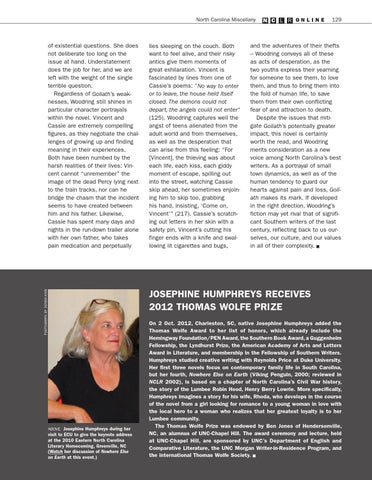North Carolina Miscellany
of existential questions. She does not deliberate too long on the issue at hand. Understatement does the job for her, and we are left with the weight of the single terrible question. Regardless of Goliath’s weaknesses, Woodring still shines in particular character portrayals within the novel. Vincent and Cassie are extremely compelling figures, as they negotiate the challenges of growing up and finding meaning in their experiences. Both have been numbed by the harsh realities of their lives: Vincent cannot “unremember” the image of the dead Percy lying next to the train tracks, nor can he bridge the chasm that the incident seems to have created between him and his father. Likewise, Cassie has spent many days and nights in the run-down trailer alone with her own father, who takes pain medication and perpetually
lies sleeping on the couch. Both want to feel alive, and their risky antics give them moments of great exhilaration. Vincent is fascinated by lines from one of Cassie’s poems: “No way to enter or to leave, the house held itself closed. The demons could not depart, the angels could not enter” (125). Woodring captures well the angst of teens alienated from the adult world and from themselves, as well as the desperation that can arise from this feeling: “For [Vincent], the thieving was about each life, each kiss, each giddy moment of escape, spilling out into the street, watching Cassie skip ahead, her sometimes enjoining him to skip too, grabbing his hand, insisting, ‘Come on, Vincent’” (217). Cassie’s scratching out letters in her skin with a safety pin, Vincent’s cutting his finger ends with a knife and swallowing lit cigarettes and bugs,
N C L R ONLINE
129
and the adventures of their thefts – Woodring conveys all of these as acts of desperation, as the two youths express their yearning for someone to see them, to love them, and thus to bring them into the fold of human life, to save them from their own conflicting fear of and attraction to death. Despite the issues that mitigate Goliath’s potentially greater impact, this novel is certainly worth the read, and Woodring merits consideration as a new voice among North Carolina’s best writers. As a portrayal of small town dynamics, as well as of the human tendency to guard our hearts against pain and loss, Goliath makes its mark. If developed in the right direction, Woodring’s fiction may yet rival that of significant Southern writers of the last century, reflecting back to us ourselves, our culture, and our values in all of their complexity. n
photograph by donna Kain
Josephine Humphreys Receives 2012 Thomas Wolfe Prize
Above Josephine Humphreys during her
visit to ECU to give the keynote address at the 2010 Eastern North Carolina Literary Homecoming, Greenville, NC (Watch her discussion of Nowhere Else on Earth at this event.)
On 2 Oct. 2012, Charleston, SC, native Josephine Humphreys added the Thomas Wolfe Award to her list of honors, which already include the Hemingway Foundation/PEN Award, the Southern Book Award, a Guggenheim Fellowship, the Lyndhurst Prize, the American Academy of Arts and Letters Award in Literature, and membership in the Fellowship of Southern Writers. Humphreys studied creative writing with Reynolds Price at Duke University. Her first three novels focus on contemporary family life in South Carolina, but her fourth, Nowhere Else on Earth (Viking Penguin, 2000; reviewed in NCLR 2002), is based on a chapter of North Carolina’s Civil War history, the story of the Lumbee Robin Hood, Henry Berry Lowrie. More specifically, Humphreys imagines a story for his wife, Rhoda, who develops in the course of the novel from a girl looking for romance to a young woman in love with the local hero to a woman who realizes that her greatest loyalty is to her Lumbee community. The Thomas Wolfe Prize was endowed by Ben Jones of Hendersonville, NC, an alumnus of UNC-Chapel Hill. The award ceremony and lecture, held at UNC-Chapel Hill, are sponsored by UNC’s Department of English and Comparative Literature, the UNC Morgan Writer-in-Residence Program, and the international Thomas Wolfe Society. n
